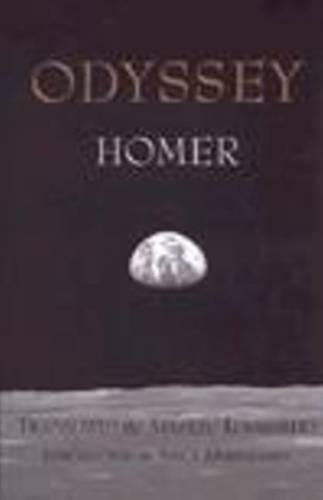
Odyssey
(Hardback)
Available Formats
Paperback
Published: 1st March 2000
Hardback
Published: 1st March 2000
Paperback
Published: 31st May 2018
Publishing Details
Odyssey
By (Author) Homer
Translated by Stanley Lombardo
Introduction by Sheila Murnaghan
Hackett Publishing Co, Inc
Hackett Publishing Co, Inc
1st March 2000
United States
Classifications
Tertiary Education
Non Fiction
Literary studies: poetry and poets
Literary studies: ancient, classical and medieval
883.01
Physical Properties
Hardback
480
Width 139mm, Height 215mm
680g
Description
Lombardo's Odyssey offers the distinctive speed, clarity, and boldness that so distinguished his 1997 Iliad. Lombardo has created a Homeric voice for his contemporaries: fresh, quick and verbally engaging to the modern ear, as the original was to the ancient. His characters come alive as real people expressing real feelings with urgency and verve. This would be very welcome for classroom use.
Reviews
[Lombardo] has brought his laconic wit and love of the ribald. . . to his version of the Odyssey . His carefully honed syntax gives the narrative energy and a whirlwind pace. The lines, rhythmic and clipped, have the tautness and force of Odysseus' bow.--Chris Hedges, The New York Times Book Review
The definitive English version of Homer for our time.-- The Common Review: The Magazine of the Great Books Foundation
Lombardo weaves his cherished idioms into important patterns of repetition and transformation so familiar to the telling of the Odyssey. . . Above all, such familiar phrases serve to remind us of the oral character of the original Odyssey , providing the reader with an uncanny immediacy and relevance.--Christina Zwarg, The Bryn Mawr Classical Review
"Lombardo has the simple gift of summoning up a Homeric flavor wherever he turns. He may even blend contemporary colloquialisms with an antique epic grandeur, and the effect remains unimpaired. As Lombardo tells us, he recites and performs, he impersonates the poem as if he were the bard. We follow, we explore, plunging into 'medias res'. Homer arises before him as an encompassing reality. Lombardo moves at ease through this Homeric world, without artifice or rhetoric, attuning his verse to Homer's composition. Homer is here a vindication of poetry." Paolo Vivante, McGill University
"Lombardo has created a Homeric voice for his contemporaries: fresh, quick, and verbally engaging to the modern ear, as the original was to the ancient. His characters come alive as real people expressing real feelings with urgency and verve. I very much like the language and the pace of this version, and would welcome it for classroom use." Joseph Russo, Haverford College
"What could be finer / Than listening to a singer of tales / . . . with a voice like a god's' So Odysseus on the bard Demodocus. And the singer, the oral poet, the 'aoidos', is what Lombardo embodies in his Homer. With a line and a language hammered out in public performance, he has made a verse that can move his audience to tears and even to laughter. At first glance, the simplicity startlesspare syntax, the highest proportion of short words in modern English poetry, colloquialism in the saddle, sudden and direct contact with the matter. But then the wonders of how he works become evident. So much was already to be seen/heard in Lombardo's version of the Iliad . But his Odyssey moves beyond, its verse widening its range to everything in between tears and laughter, able to present a storm, a battle, a chiding, a fable, a tale, and a whine with equal deftness. No version of the Odyssey is more immediate. No version shows better one of Homer's essentials: the oral poet at work. The persona is there, and it's real." Douglass Parker, University of Texas at Austin
"Ever since the publication of Stanley Lombardo's extraordinary translation of the Iliad, we have been waiting eagerly for his Odyssey , and it has been well worth the wait. Lombardo has done it again: he has rendered the Odyssey into English just as accurate, as perspicuous, and as gripping as that in his Iliad. Students will probably be unable to resist reading it in great long chunks. Lombardo's translation is enhanced by Sheila Murnaghan's characteristically lucid and accurate introduction, which will be a boon to teachers of undergraduates (or even high school students)." John Kirby, Purdue University
"It sheds new light, guiding us through a psychology of language we understand in order to show us the shadows of something quite alien to contemporary, secular experience. The language is honed, so that event, object and emotion are revealed by a tone of voice, or a compressed stanza that draws out an essential element without the accompanying poetic distortions of romance. This translation delivers the goods without dallying in over-amplified academic considerations. Instead, the words retain a kind of artful weight, with the emotional stress intact." First Intensity Magazine
Author Bio
Stanley Lombardo is Professor of Classics, University of Kansas.
